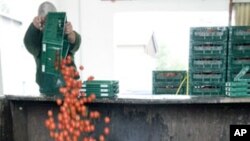Two more people have died in Europe's worst E. coli outbreak in recent history, even as German health officials say the number of new infections is dropping.
At least 25 people have now died and more than 2,600 have been sickened since late May as a result of the mysterious bacteria. Nearly all the victims live in or visited northern Germany.
Health Minister Daniel Bahr said that despite the deaths, fewer new infections could signal that the epidemic is on the decline. Bahr made the statement Wednesday on public television, just before an emergency meeting with health officials.
|
E. coli and how it is transmitted E. coli is an abbreviation for Escherichia, which is a large and diverse group of bacteria. Most strains are harmless, others can cause illness. Symptoms include stomach cramps, diarrhea and vomiting. The major source is cattle, but other animals, foods and liquids may spread contamination to people.
|
On Tuesday, a top World Heath Organization official said the source of the deadly outbreak may never be known.
EU Farm Commissioner Dacian Ciolos has recommended a $220 million aid package to help farmers recoup some of their losses from unsold vegetables because of the E. coli crisis.
Overturning initial suspicions, German investigators have ruled out home-grown organic sprouts, as well as lettuce, tomatoes and cucumbers from Spain. Spanish Agriculture Minister Rosa Aguilar is demanding full compensation from Germany for losses suffered by farmers in her country.
Spanish farmers whose revenue has been hard-hit by the outbreak, on Wednesday gave away some 30 tons of fruit and vegetables to people in Madrid.
Russia and some other countries have banned all vegetables from the EU.
E. coli symptoms include stomach cramps, diarrhea, fever, vomiting, and in extreme cases kidney failure and death.
Some information for this report was provided by AP, AFP and Reuters.
**VOA earlier referred to E. coli as a virus, we regret the error.




